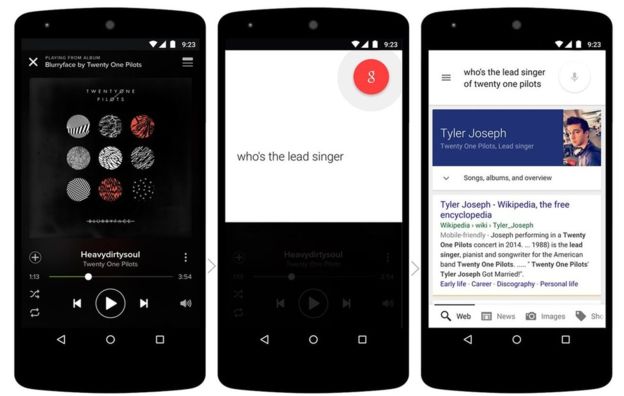For more than a decade, boxes have helped Google dominate search - both the rectangle on its home page and the web browser address bars that send users to its results.
But smartphones now account for more internet use than PCs, and that changes things.
"When you have a 5in-diagonally-across screen - it's not designed to type," acknowledges Google's search chief Amit Singhal.
"So, on mobile you have to fundamentally give users new ways to interact."
To address the problem, Mr Singhal's team has developed Now on Tap.
The facility - which is being released as part of the latest Android mobile operating system - lets users get related information about whatever is on their handset's screen with a single button press.
As an example, Mr Singhal describes a text chat with his wife, in which he suggests a restaurant.
He explains his spouse could bring up driving directions and the place's opening hours simply by holding down the home button when the restaurant's name was displayed.
The feature works with any app. And if someone wants to know something specific, they can trigger a contextual voice search by saying: "OK Google".
One possibility would be asking: "Who's the lead singer?" when a song's name is displayed in Spotify.
"It's search designed for the mobile world," says Mr Singhal.
"You don't have to switch windows to type information into one window and then go to another."
Privacy
Like many of Google's services, there's a trade-off involved.
Those using the service will end up disclosing ever increasing amounts of information about their interests and habits.
That helps Google target its ads, but also opens it up to criticism.
"They're gobbling up everything they can learn about you and trying to monetise it," said Apple's chief executive Tim Cook earlier this year.
"We think that's wrong… and we think some day, customers will see this for what it is."
Apple has made much of the fact it anonymises information gathered about users, meaning, for example, it sends location-specific alerts without recording their travel histories alongside their account IDs on its servers.
Mr Singhal retorts that Google gives users "full control" over the data it has access to, but adds that he believes people appreciate the benefits that sharing their data makes possible.
"If Google doesn't know where my office is or what time my next meeting is, it can't [automatically] tell me there is traffic - please leave now," he says.
"We believe with opt-in and proper consent and control over your data, Google can provide you so much more value."
Virtual helpers
Resting on its laurels wasn't an option.
US-based users spend more than six times more hours using apps rather than mobile browsers - often to search for goods - according to a recent study by Comscore.
Now on Tap prevents Google being shut out of such activities when the apps aren't its own.
But the firm faces an additional threat - consumers are increasingly being encouraged to use rivals' virtual assistants:
Apple pioneered the way with Siri, and is about to extend the service to TVs
Microsoft has brought Cortana to Windows 10 and is expanding it to Android and iOS
Facebook is testing M on its Messenger app
Amazon is offering Alexa to third-party gadgets and apps
(BBC)
www.ann.az
Follow us !











